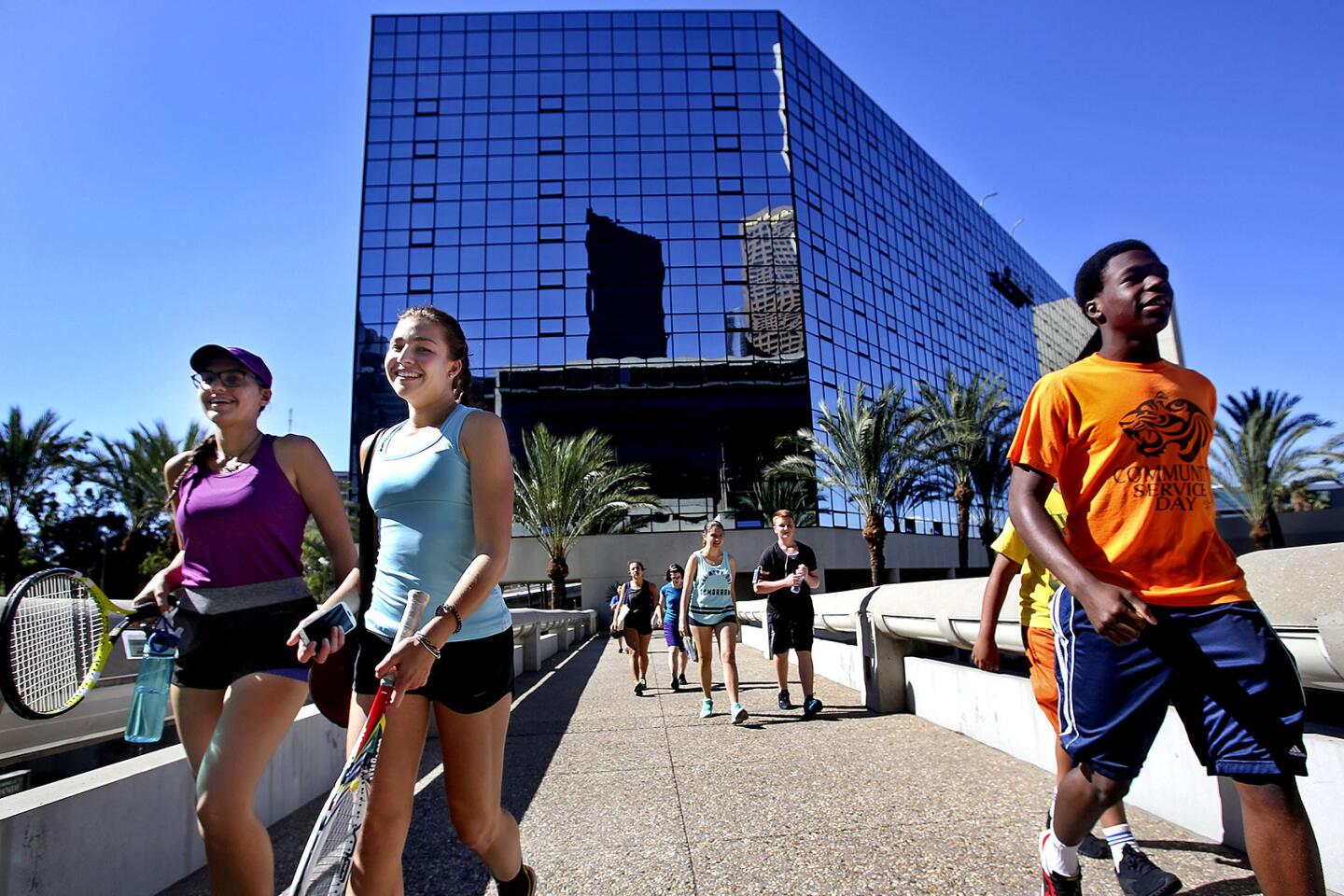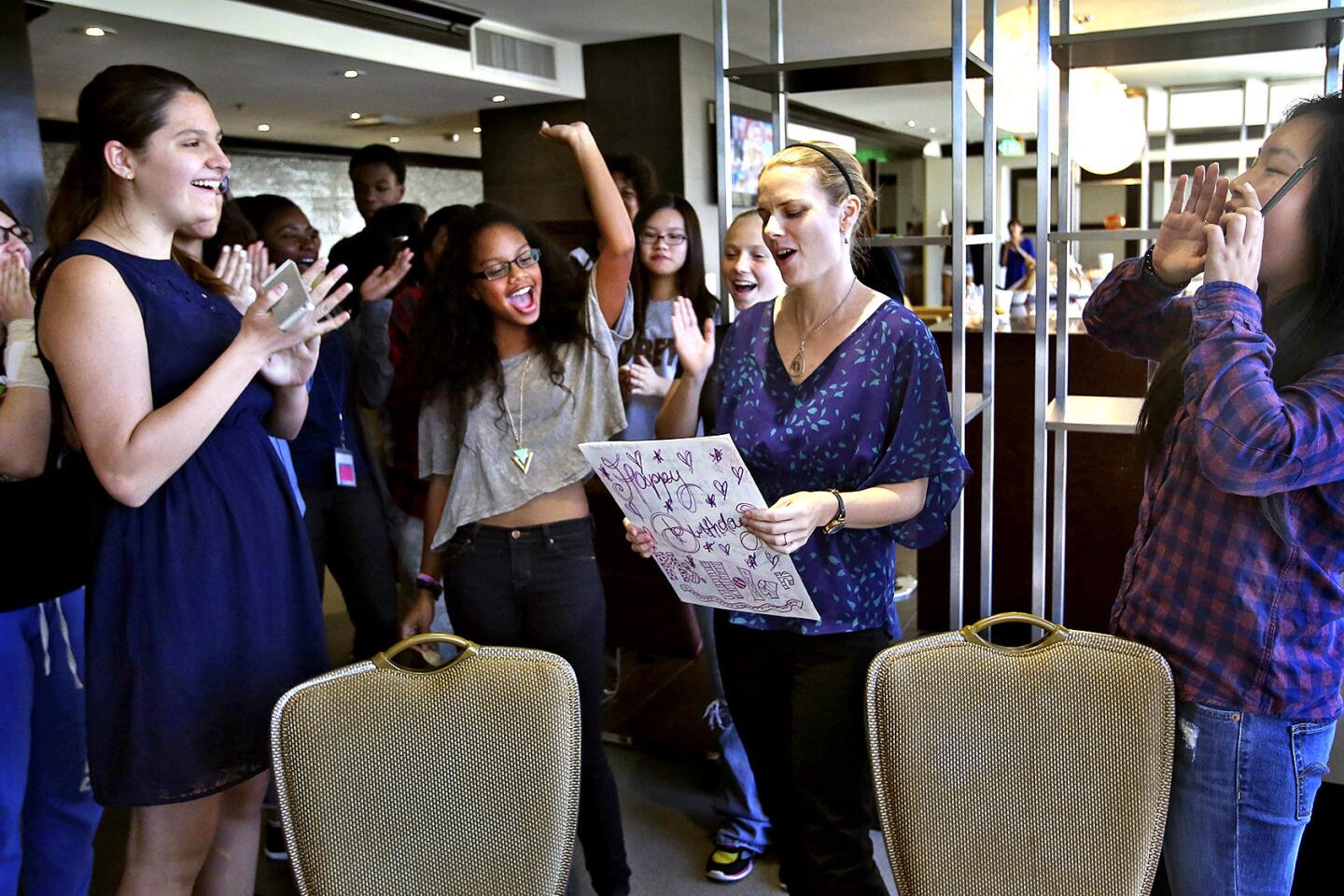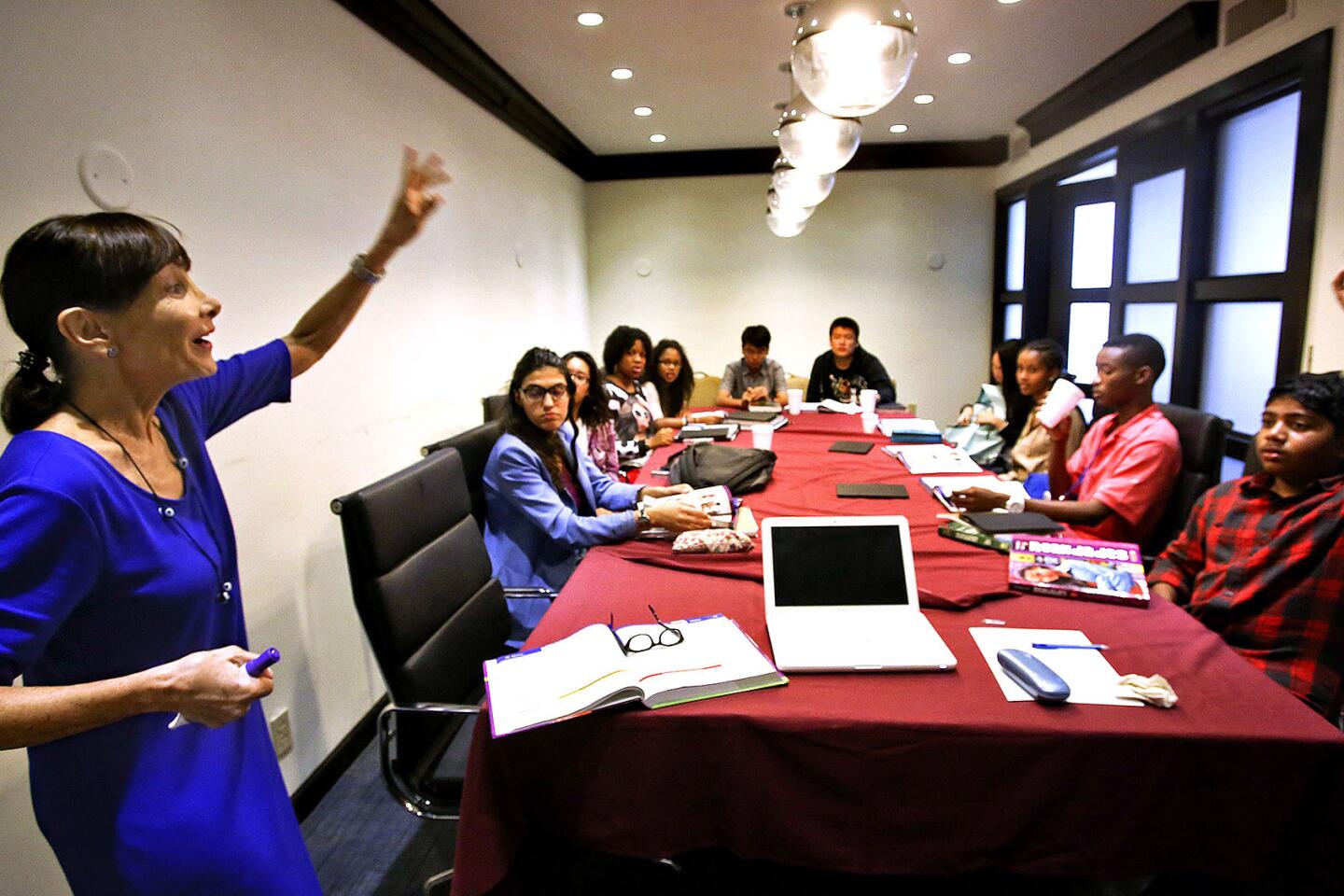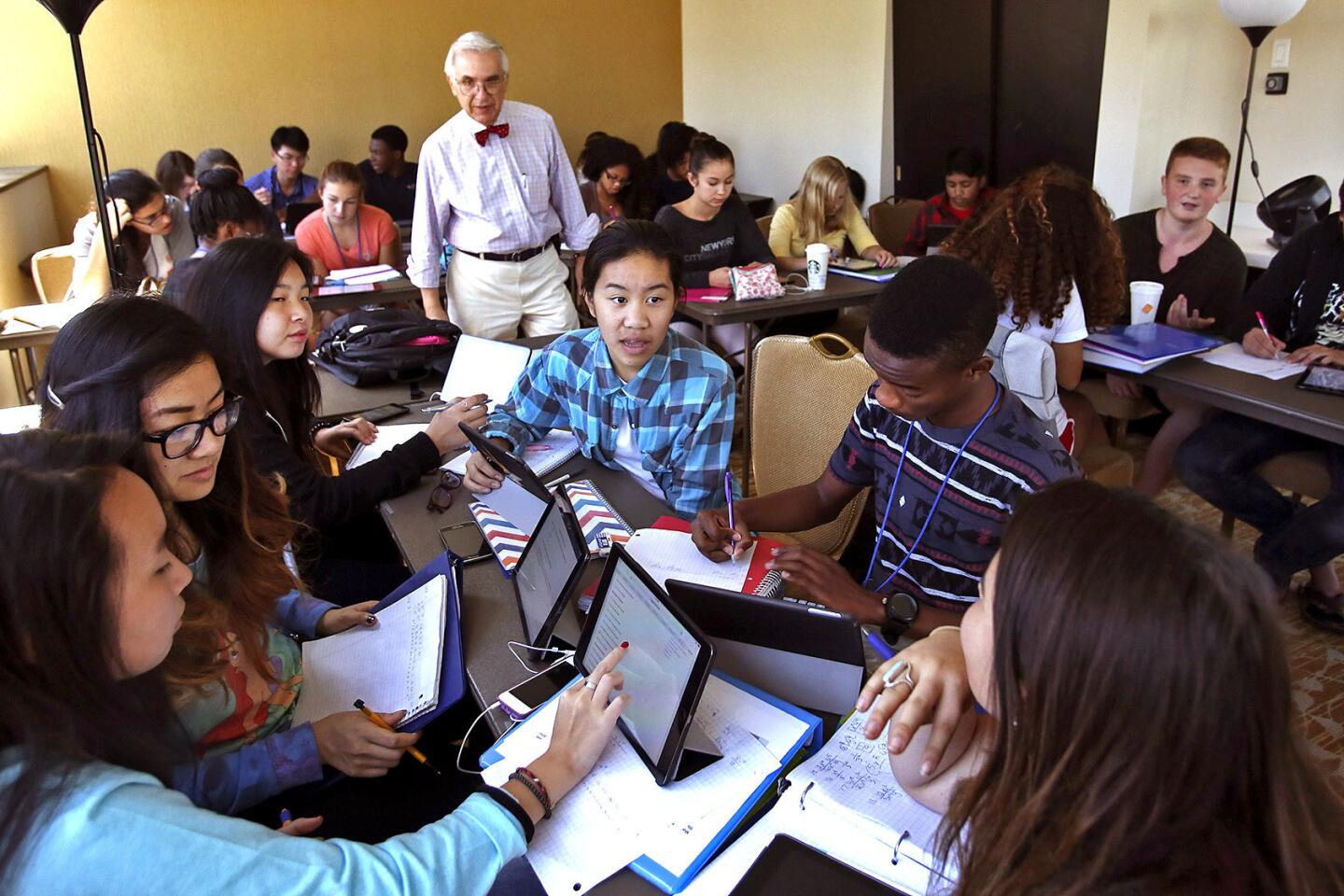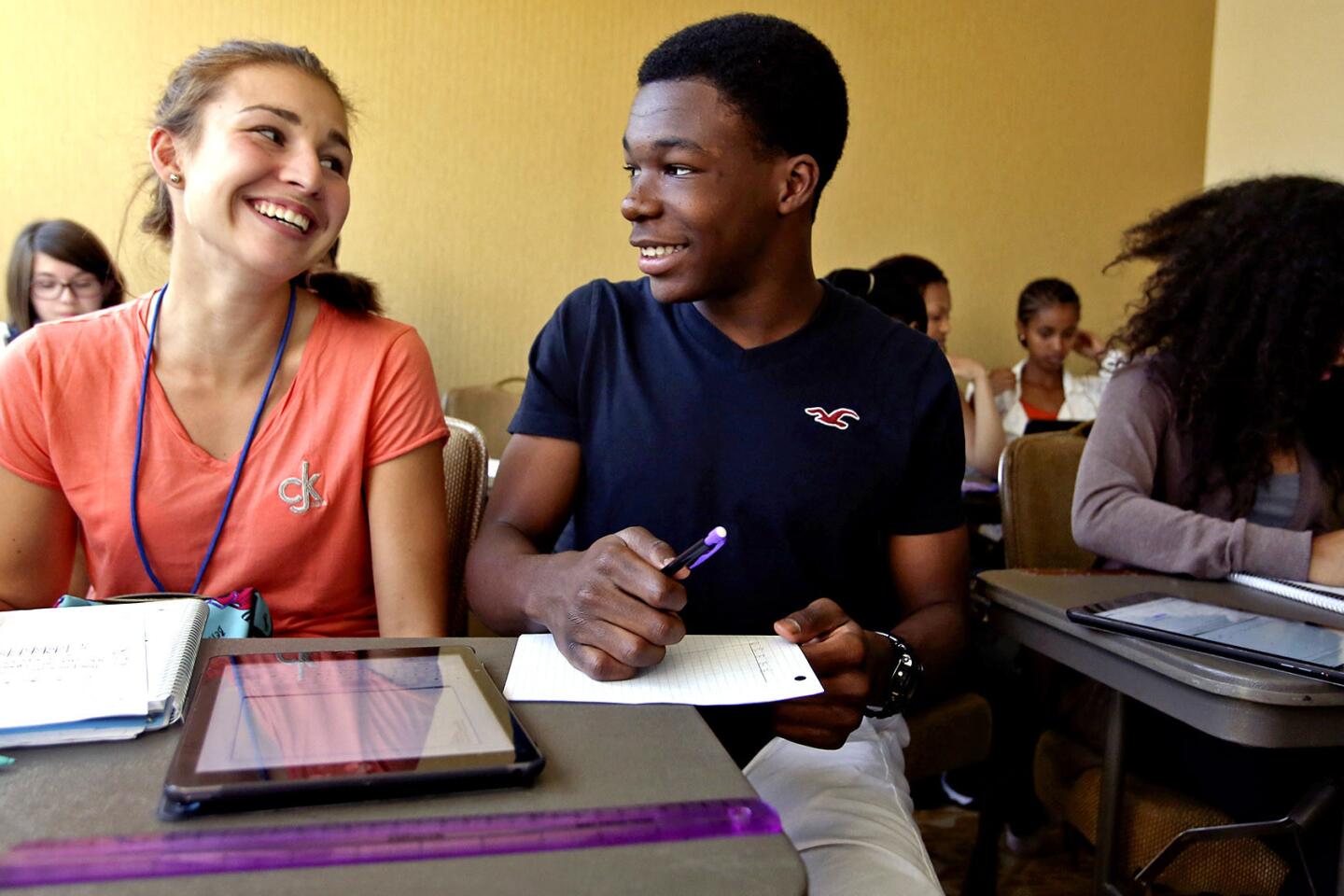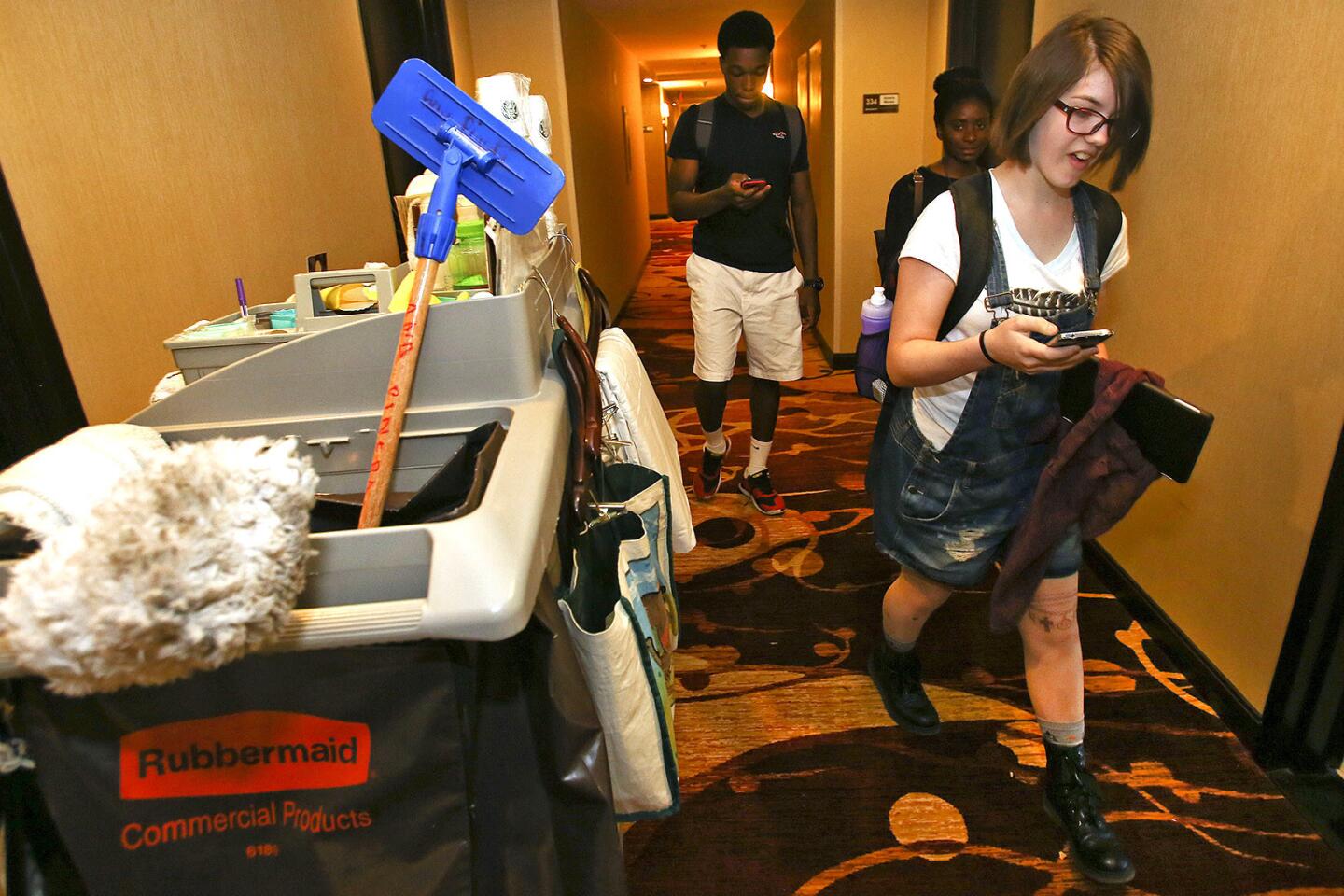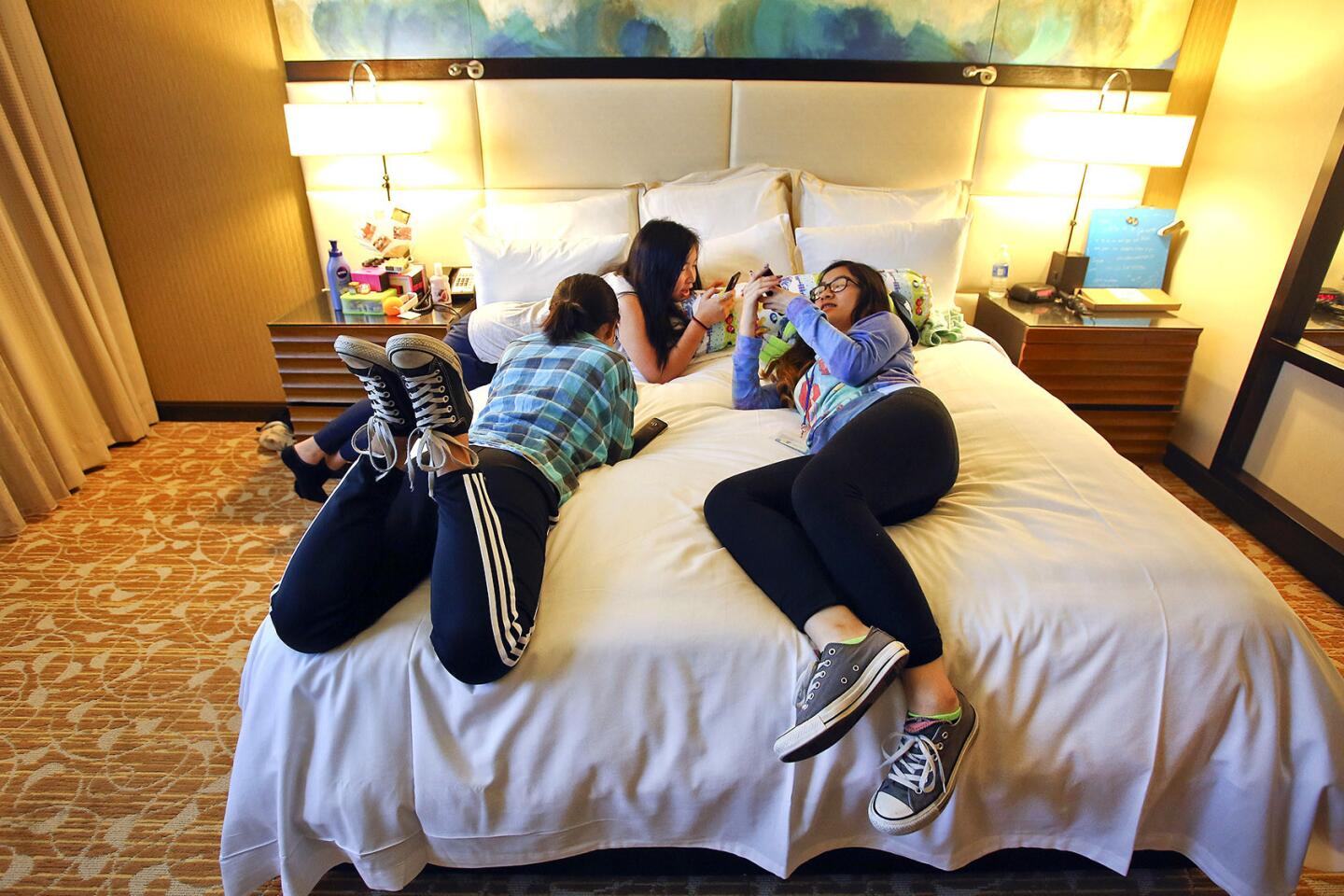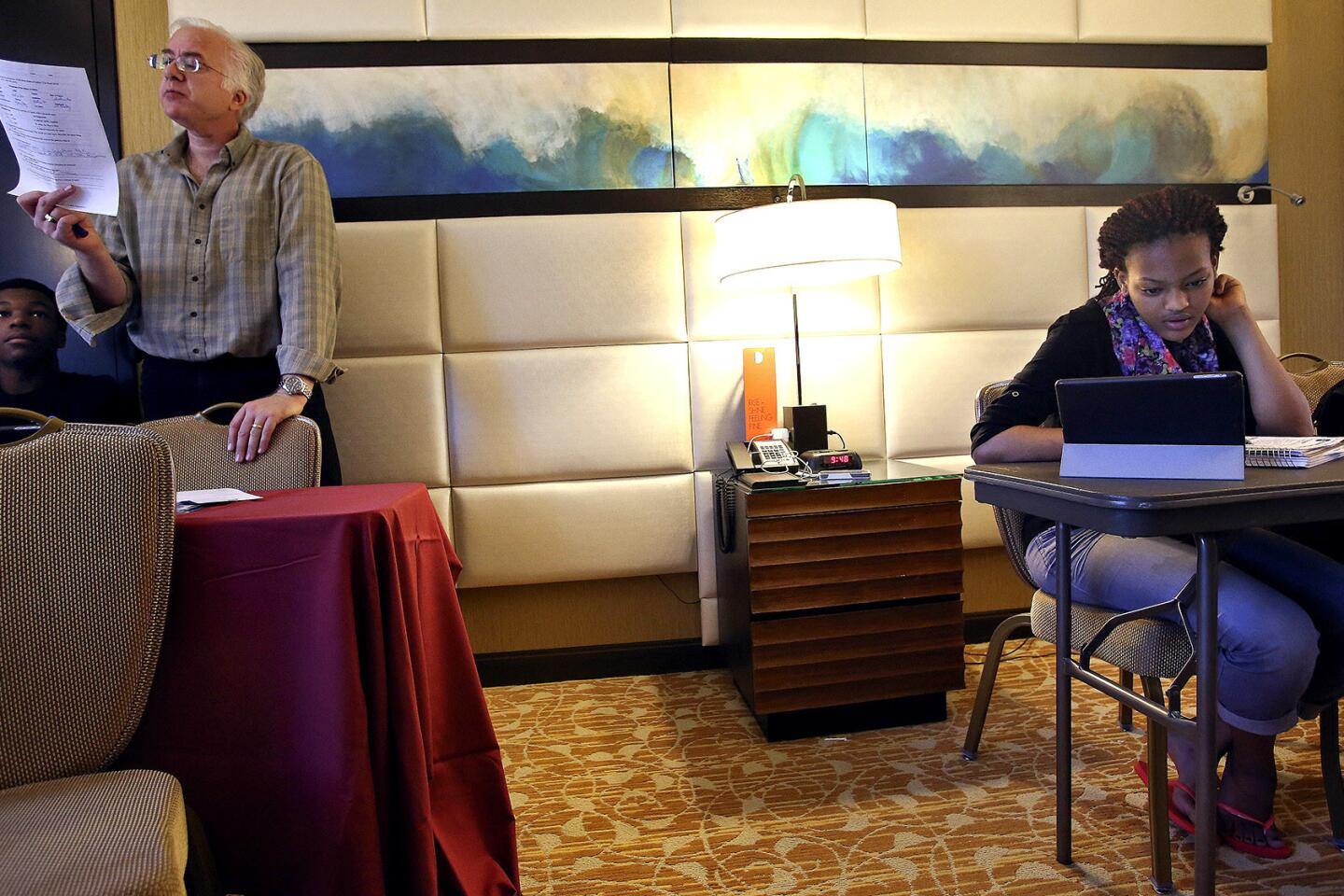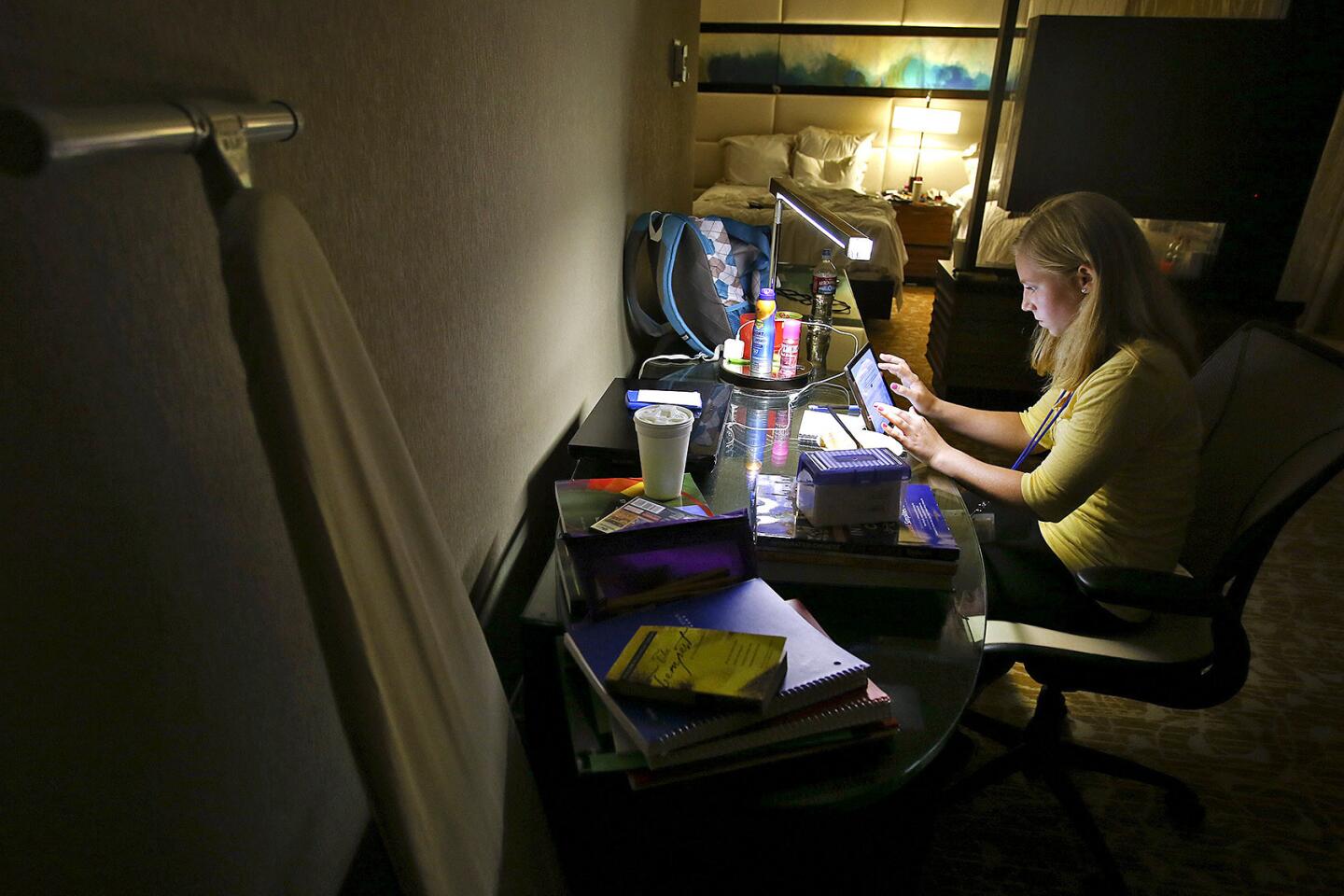New downtown L.A. boarding school aims to enhance culture, education
The elevator doors slide open on the 11th Floor, and Annie Chau, 14, walks down a plush carpeted hallway, a backpack slung over her shoulder.
She pushes open a door to reveal a lushly appointed dining room with a sweeping view of the downtown Los Angeles skyline. A catered lunch has been laid out — gyros, saffron rice and pita bread with more than a dozen fixings. She joins a group of teenagers gathered around an iPad at a polished granite table.
It’s lunchtime at the American University Preparatory School, a new private boarding school that occupies two floors of a luxury downtown hotel off Figueroa and Third streets.
The school is the brainchild of Chinese billionaire Wei Huang, who made his fortune in real estate.
California has seen a wave of Chinese investment in the last few years — more than $1.3 billion between 2000 and 2011 alone, according to a report by Rhodium Group, a New York consulting firm that studies global economic trends. Immigrant wealth has built hotels, shopping centers and mansions across the suburbs of the San Gabriel Valley.
But the high school represents a different kind of international investment — an attempt to add to the city’s cultural and educational infrastructure for both foreigners and Americans.
The school caters to students from families in the U.S. and around the world. Tuition and board cost $45,000 a year, every student gets a school-issued iPad and some of the teachers hold doctoral degrees. Some financial aid is available.
Huang is chairman of the Shenzhen New World Group, which spent an estimated $60 million to purchase the hotel — a Marriott property in foreclosure — and re-christen it the L.A. Hotel Downtown. His company also owns the Sheraton Universal Hotel in Universal City.
He decided to start American University Prep after searching for such a school for his two children in the U.S., said chief executive and headmaster David Unruh.
Huang, a self-made billionaire who has worked as a waiter, clerk, salesman and real estate agent, wanted a school that could help ease an international student’s transition to the United States while providing language and support services.
The school opened in August with 28 students in 9th and 10 grades. Administrators plan to expand to 300 students in all four high school grades, and about half of those are expected to come from other countries.
Unruh, a former UCLA administrator who helped recruit students from China, says the school plans to focus its recruitment efforts on Asia and Europe.
The students don’t get room service or chocolates placed on their pillows, and HBO is blocked. But a maid comes by once a week to clean their rooms.
It’s a welcome change for teens like Chau, who shares a room with siblings at her home in Baldwin Park. Her mother works at a nail salon, and her dad at a restaurant.
“It’s been really fun so far,” said Chau. “It does feel like home. But there’s a ton of homework.”
The plush digs are temporary: The school is building more traditional dorms in a neighboring building.
Anyway, it’s not the accommodations that are the school’s main draw, Unruh said. He wants to lure a mix of international and domestic applicants with a curriculum that emphasizes what are known as STEAM fields: science, technology, engineering, arts and mathematics, plus L.A.’s cultural resources.
Students take music lessons from the Colburn School on Grand Avenue, play tennis at the World Trade Center across the street and work out at the downtown YMCA. The basement of the old Laemmle movie theater on Figueroa will serve as cafeteria, science lab and auditorium.
They attend classes with titles like “Identity, Ethnicity, Nation” and “Ethics and Global Societies,” and a special integrated math class that meets in a lounge down the hall from where the students stay.
On a recent weekday, Dean Schonfeld, a former Monrovia public school math teacher, was instructing his students on how to use math to map the spread of a plague — a lesson he crafted in response to headlines about the Ebola epidemic.
At one table, Grace Bryant, a 15-year-old from Alameda, taught Peter Xin, 15, of Shanghai, about exponential functions, as Timo Makhlay, 14, of Moscow, looked on.
“What’s an exponential function?” Xin asked.
“It’s like 3 to the x,” Bryant said, then helped him spell the word “exponential” for his notes.
The student body is split evenly between domestic and international students, and their career plans are as diverse as their backgrounds.
Makhlay’s father is a developer in Switzerland, and the teen wants to be an architect. Bryant, a dancer, wants to become an astronaut. Xin is taking guitar lessons and thinking about becoming a professional musician. A student from the Czech Republic juggles classes while she trains to be a professional tennis player.
Schonfeld said he took the job because he wanted a chance to shape his own curriculum. Teaching at the school feels like working at an education startup, he said.
As for discipline problems — there are none.
“They all do their homework. They ask questions constantly and became friends very fast,” Schonfeld said.
Teachers and students say they appreciate the intimacy of the downtown campus and small student body.
“Everything and everyone is close by, and I’m not nearly as exhausted,” Bryant said.
At lunch, students from as far as Vietnam bond with San Fernando Valley teenagers over what they said was the crushing weight of Schonfeld’s math homework.
“Don’t even get me started,” said Caitlynne Thomas of Arlington, Texas.
She says she started looking for boarding schools because the schools in Arlington were “horrible.” Like several other students, Thomas found out about the school through a website called boardingschoolreview.com.
At home, her mother delivers pizzas, and her father isn’t in the picture. A scholarship and financial aid are helping to pay her tuition. Attending the boarding school, she said, gives her a better chance at a future than the high school she would have attended in Texas.
“The teachers were good, but the administration could care less,” Thomas said.
After lunch, optional discussion groups meet in lounges on the third floor of the hotel. About 10 students gathered recently to discuss religious violence and terrorism. After playing a video that profiled militias around the world, instructor Felicia Graham posed a question: “What do you think of when you think of religious violence?”
“ISIS,” offered one student, using a common acronym for Islamic State, the radical group that has seized large swaths of territory in Syria and Iraq.
Another raised his hand. By the end of the hour, every student had spoken — their iPads stayed dark and no one got on Facebook. They discussed the violent Nigerian Islamic militant group Boko Haram and the Unabomber, and looked for media bias in stories about President Obama’s response to the Ebola epidemic.
Between classes, students buzzed with excitement about class trips to Disneyland and Knott’s Berry Farm. Many were excited to create traditions and start clubs. Bryant wants to found a chapter of the National Honor Society, and Xin and Makhlay are lobbying for a basketball club. Student government elections will be held soon.
Some just appreciate being away from home for the first time.
“I’m really independent, so this is good for me,” said Millenn Mong, 14, of San Francisco. She researched the school herself and filled out all of her own applications.
“We’re still building the school,” Mong said. “We’re like pioneers!”
Everyone at her lunch table laughed and nodded in agreement.
Twitter: @frankshyong
More to Read
Sign up for Essential California
The most important California stories and recommendations in your inbox every morning.
You may occasionally receive promotional content from the Los Angeles Times.
